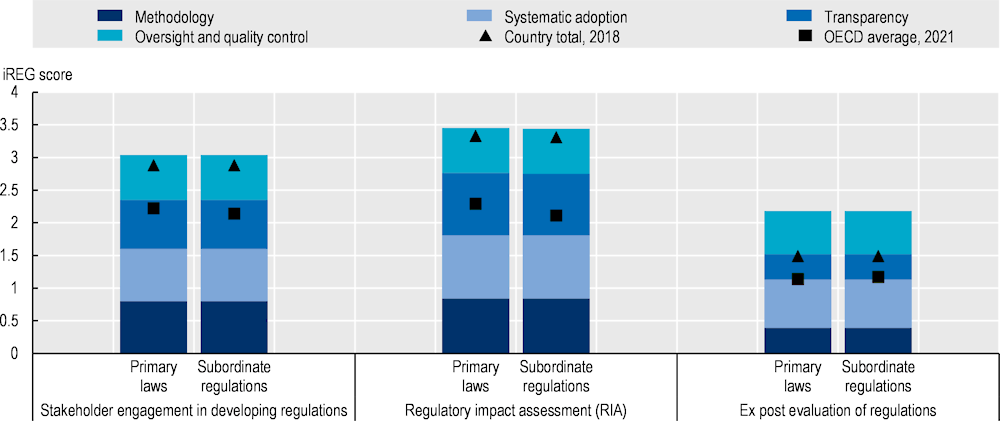Korea has incorporated several changes in its regulatory policy system over the last years. For RIA, this includes a 2018 reform requiring analysis to be proportionate to the significance of the regulation, and requiring alternative regulatory options to be assessed for all subordinate regulations. New RIA guidelines in 2018 allow for more systematic assessment and implementation, which were followed by impact reporting and guidance on RIA for SMEs in 2020.
Consultations are conducted for all regulations initiated by the executive, and recent efforts have aimed to increase the transparency of consultation processes. The e-Legislation Centre and Regulatory Information Portal now provide notification of upcoming consultations and enable online participation for all consultations, in parallel with email, public meetings and through the post. While consultation on draft texts are widespread, early-stage consultation to identify different policy options could be strengthened. Korea continues to use e-consultations to receive advice on regulations, including the petition system “Regulatory Reform Sinmungo” that alerts the government to unnecessary burdens on business and citizens.
Ex post evaluation is mandatory for all regulations developed by the executive and central ministries, which are required to outline the intended evaluation plan as part of each RIA. Packaged reviews of ex post evaluations are now subject to quality control. Reviews have been undertaken looking at administrative burdens, compliance costs, and reducing regulatory difficulties in new industries, and a 2018 reform required agencies to reduce burdens on SMEs.
Regulatory oversight is conducted by the Regulatory Reform Committee (RRC), which is co-chaired by the Prime Minister and a representative from the non-government sector and which reviews all regulatory proposals from central administrative agencies. The Office for Government Policy Coordination, through the Regulatory Reform Office, acts as the RRC’s secretariat, playing an oversight and steering role across central agencies. In 2018-19, a series of legal updates expanded RRC’s mandate to include reductions in the regulatory burdens on SMEs, regulatory sandboxes, public engagement in regulatory reform, and administrative procedures and instruments for regulatory innovation. The Office for Government Policy Coordination conducts an annual evaluation of its own units which involves various performance indicators, such as the level of satisfaction with the improvement of public procurement regulations, the level of regulatory improvement and the level of compliance with RRC recommendations. Two research centres, the Korea Development Institute and the Korea Institute of Public Administration, support cost-benefit analysis, provide guidance, training, and conduct evaluations of regulatory policy.
Indicators presented on RIA and stakeholder engagement for primary laws only cover processes carried out by the executive, which initiates approximately 10% of primary laws in Korea. Primary laws initiated by parliament are not accompanied by a RIA and not always supported by stakeholder engagement. To further improve regulatory quality in Korea, there should be regulatory quality check mechanisms put in place for regulations initiated by the National Assembly.


 All/■ Always/▲ Yes
All/■ Always/▲ Yes  Major/■ Frequently
Major/■ Frequently Some/■ Sometimes
Some/■ Sometimes Never/▲ No
Never/▲ No